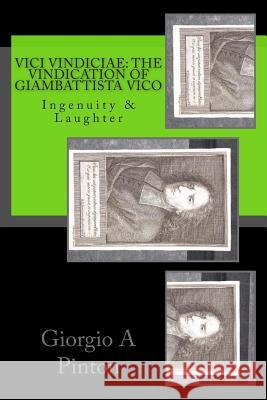Vici Vindiciae: The Vindication of Giambattista Vico: Ingenuity & Laughter » książka
Vici Vindiciae: The Vindication of Giambattista Vico: Ingenuity & Laughter
ISBN-13: 9781505920314 / Angielski / Miękka / 2015 / 164 str.
For an author, his books are sacred. They have to be considered in all their truth and the information about them should be publicized with clarity and precision. They can be the object of criticism and considered in relation to the value that they add to human culture, no matter in what field of knowledge. Honest and learned critics should be the judges of the value of the contemporary literary production. Some literary testaments reach the top of the peak of fame, but in a short period of days descend on the common walking path and cash in no more. Other volumes of black on white relentlessly tries to become valuable but remain undiscovered and speechless through generations. Then are suddenly rediscovered and for the power that irradiate from them their authors returns to be alive within the "now and here." This is what happened to a Neapolitan gentleman between 1668 and 1744 who spent his life and energies in the understanding of the common nature of nations. Perhaps, given that a nation is nothing but a mass of particular individuals sharing the same conveniences, utility, and interests, this gentleman should have confessed that he studied the common nature of all human beings. He did say that the human being is infinite; nothing can fulfill this human entity in its restless search for knowledge and happiness. Civil nations are only trying to keep some restraining with channeling into institutions and submission under laws. The man was said to be crazy by some contemporaries and they may have been right then, because he even dared to create a New Science, a treatise that combined all his furor-full ideas. In 2000s, the ideas more than the name of this gentleman have penetrated the sanctuaries of learning and doing. In Europe, the disrespect of the ideas of this man on the true nature of the human beings and nations, the sages already see falseness of the assumption of making and continuing with a United Europe. Nations do not come first, man is. Thus his New Science Revolutionary Manifesto arrived at the heart of Europe (Leipzig) late and falsified in its title, its author, its value disregarded by its compatriot citizens of Italy. The great scholars of Leipzig did not even look inside the volume. The anger of this author exploded, but soon like a slow fire found some comfort in the comfortable healing of the few friends that read the book and publicly admitted its inappropriateness for the times. Some books have no words for their contemporaries; the future speaks in them.
Zawartość książki może nie spełniać oczekiwań – reklamacje nie obejmują treści, która mogła nie być redakcyjnie ani merytorycznie opracowana.











